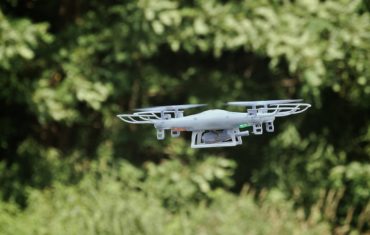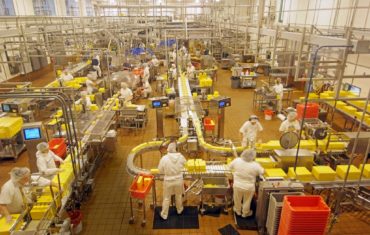FCC Chairman Gets a Taste of California’s Digital Divide

In a quest to understand what the Digital Divide looks like from the vantage point of America’s farmers and rural residents, Federal Communications Chairman, Ajit Pai, spent time on the ground last week in the Sacramento region.
Hosted by Valley Vision and the Sacramento Metro Chamber, the Chairman visited agricultural sites in Yolo County and heard first-hand from farmers, business and community leaders about the Divide, literally 10 miles away (as the crow flies) from the state capitol of California – the fifth largest economy in the world. The tour of the region’s rich agricultural areas kicked off Monday morning at the Muller Ranch just outside of the City of Woodland. A group of about 20 regional, state and federal broadband experts and local business and community leaders was graciously hosted by ranch owner Frank Muller. Frank also serves as Chairman of the Board of Pacific Coast Producers and is a Member of the California State Food and Agriculture Board. In addition, his ranch serves as a site for Valley Vision’s Yolo County agricultural technology (AgTech) pilot funded by the California Emerging Technology Fund (CETF) and in partnership with California State University, Chico.
Frank welcomed the group and gave an overview of ranch operations, his role on State Ag Board and his work with Pacific Coast Producers. Muller Ranch grows diversified crops such as tomatoes, almonds, walnuts, grapes and vegetables on 10,000 acres in several different fields. Chairman Pai, dressed for a day in the fields in jeans and a hoodie, listened intently and engaged in the discussion as members of the group shared their individual stories. Frank gave examples of the impacts of the lack of high-speed internet, or broadband, from two perspectives. From the business side, the lack of broadband coverage in his fields inhibits the use of AgTech that can help farmers manage operations for increased resource efficiency and productivity.
Frank held up two pieces of equipment designed for the purpose of measuring water in the soil. The first, the reliable old tool that pulls a sample of soil that is analyzed for moisture by eye and touch. The second, a rod inserted into the ground with sensors on top that capture measurements for soil moisture and nitrogen level, which along with other data points, are uploaded to ‘the cloud’ for analysis and ability to apply accurate, real-time, prescriptive treatments. The return on investment of such technology is estimated to be 18-19 percent, according to Sunne Wright McPeak, President & CEO of CETF.
Frank described how this type of predictive analysis is the future of farming. The challenge for Frank, however, is access to a reliable broadband signal capable of uploading the information in real-time. Susan Strachan of CSU Chico’s Geographical Information Center, (which conducts broadband mapping for the California Public Utilities Commission), shared an overview of the Yolo County on-farm mobile broadband mapping project of 155 farms that she conducted for the AgTech Pilot and the results of tests on Muller Ranch. This granular mapping of coverage highlights where signals are clearly lacking as compared to higher level coverage maps. These types of tests and mapping help make broadband coverage and availability mapping much more accurate. This is vital for several reasons, including that eligibility for federal and state funding is based on the mapping data. This is the first project of its kind in the country. The Chairman also experienced first-hand the lack of cell phone coverage in Frank’s conference room, underscoring the disadvantage that ag businesses experience on a daily basis.
The second perspective Frank shared with the Chairman related to personal impacts of the lack of broadband. At his grandson’s home, a family with three school-age children who live a half-mile away, only one person at a time can effectively use the Internet at home. Fortunately, for his grandson, he has only to travel a half-mile away to his grandpa’s place to get online and get his homework done. But Frank and many others in community are concerned about those who aren’t quite as fortunate. The impact of the Digital Divide is felt heavily by those without reliable, high-speed internet access at home. How far will this Divide leave them behind in today’s digital economy?
The group then took a quick drive into the City of Woodland to visit AgStart, an innovative AgTech incubator where the group was welcomed by John Selep, President of AgStart; Leanna Sweha, Program Manager, AgStart; and Ken Hiatt, Assistant City Manager, City of Woodland. John provided an overview of the incubator, the programs, and participation in the VINE (Verde Innovation Network, funded by the U.S. Economic Development Administration i-6 Innovation grant), a partnership with the University of California’s Agriculture and Natural Resources. The incubator helps local entrepreneurs grow and thrive in the food and agricultural space; these entrepreneurs provided the ag technologies used for the AgTech Pilot. The potential of innovative AgTech to improve the efficiency and productivity of the food system is exciting and seemingly unlimited. However, even in a state considered a power-house of technology, the lack of adequate broadband coverage, with adequate download and upload speeds to meet today’s business needs – let alone tomorrow’s – is a major barrier. This connectivity is essential not only on-farm but in town. Ken noted that Woodland is home to more than 100 food and ag companies, including processors and R&D – a vital part of the regional economy. Yet an updated map showing broadband grades across region, based on speed, number of providers, cost, and reliability of service, among other factors, had dismal showings for Yolo County.
The final stop for Chairman Pai was Wilson Vineyards in Clarksburg. There, the group was greeted by David Ogilvie, Vineyard Manager, Wilson Vineyards, Director of Production, Muddy Boot Wine and Silt Wine Co. David’s fields are also a site for the AgTech Pilot. David provided a tour of the vineyards and described a new project with soil moisture probes and solar panels. Similar to Muller Ranch, Wilson Vineyards is also challenged with access to broadband coverage capable of supporting his ambitions for advancing efficiencies through AgTech which are providing a 10-15% improvement. Some of the fields also lack cell phone coverage, stalling real time decision making and management. These challenges have spurred David’s involvement helping to solve the issue. For several years running, and in addition to serving the demands of farming and family, David has been an active leader of the Metro Chamber’s Cap-to-Cap federal advocacy program’s Food & Agriculture Committee. The meetings the Food & Ag team leaders held with the FCC while in Washington DC over the past two years, and the innovative AgTech Pilot, were the catalysts for the Chairman’s visit to Yolo County.
The evening before the field tours, the Chairman participated in a small roundtable discussion with local broadband, food and ag and rural development leaders. The evening included a signature Farm to Fork dining experience at Mulvaney’s B&L. Special thanks to broadband champions Assemblymember Cecilia Aguiar-Curry, Yolo County Supervisor Don Saylor, and California State Food and Agriculture and California Broadband Councilmember Joy Sterling, for their dedicated commitment to making sure all Californians have true connectivity.
Chairman Pai said he was very impressed by the level of collaboration and partnership shown at each stop along the visit, showcasing the special connectedness of our region across all aspects of the food and ag economy and the community. Valley Vision and the Metro Chamber, in partnership with the FCC, and all the leaders who joined in hosting the FCC Chairman and telling our story, look forward to delivering on our shared mission to close the Digital Divide. Valley Vision manages the CPUC-funded Connected Capital Broadband Consortium. Materials on the AgTech Pilot project, broadband mapping and grades by county and community, and the Yolo County on-farm mapping project can be found on Valley Vision’s website.
Trish Kelly is Managing Director at Valley Vision working on Food & Ag, the 21st Century Workforce and Broadband Access and Adoption.


